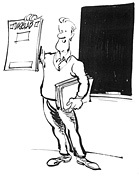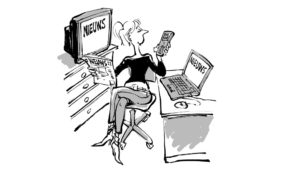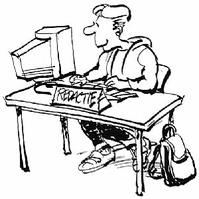News in education Netherlands (NIE) aims to promote the use of news media in education. It offers teachers and their pupils access to news media and learning programs.
Nieuws in de klas (News in the classroom) was founded in 1976 by the then Dutch Newspaper Publishers’ Association NDP (currently the Dutch Trade Organization for News Media Companies, NDP Nieuwsmedia).
Objectives News in Education Netherlands (NIE)
Now 3 objectives to promote:
- Readership / Literacy
- Media literacy
- Citizenship
through newsmedia in education.
Education with and about news media
NIE programs promote and facilitate education with and about
news media by:
- Providing schools with news media
- Developing educational materials
- Offering teacher trainings
- Conducting research about youth and news media

Availability
Services are available to teachers in:
- Primary education
- Secondary education
- Vocational education
- Language courses for immigrants / life long learning
Availability of services in Netherlands:
- Newspaper delivery: two week period, all year round
- Newsmediaportal: overview of all news sites, all year round
- Access to online news archives for a two week period
- Educational tools: all year round
Nationwide
Throughout entire school year
Why use newsmedia in education?
Because newsmedia
… are essential tools in improving language and information skills
… are vital instruments in improving citizenship and democracy
… are crucial sources
for understanding how media work (media literacy)
… are now media (both in print and digital)
And because
… reading newspapers, i.e. using the news needs to be learnt / taught: it takes media education to improve media literacy.

How does NIE contribute to (media) literacy?
NIE programs stimulate young people to inform themselves about both what’s going on in the world, and the way news media report about it by reflecting on the 5 W’s: what, who, when, where, why?
This will enable them to:
- Critically use media and media content
- Discuss and reflect about the news
- Participate actively in dissemination of information
- Become civically engaged
Media literate citizens (know how to) use news media.
Media literacy and media education programs often focus on:
- Improving computer skills
- Audiovisual media productions
- Protecting youth from harmful content
Very little attention is paid to the importance of critically dealing with content.
NIE and reading strategies
Applying the 5 W’s to news messages:
What happened, when, and where, who was involved and why?
By:
- Reading and re-reading text
- Interpreting and giving meaning to information
- Reflection and discussion

NIE and retrieving and evaluating information
Applying the 5 W’s to authors/sources:
- Who says what, when, and where, and why?
- What is their purpose/interest?
- And how do they approach the topic (style) ?
By:
- Devising search strategies
- Retrieving and organising information
- Evaluating retrieved search results: compare
NIE and creativity
Applying the 5 W’s to news production:
What am I going to write and why? When and where will I publish it? Who is my audience? And how do I approach the issue (style)
By:
- Practicing writing skills
- Practicing journalistic rules
- Active participation
- Dealing with feedback: accountability
